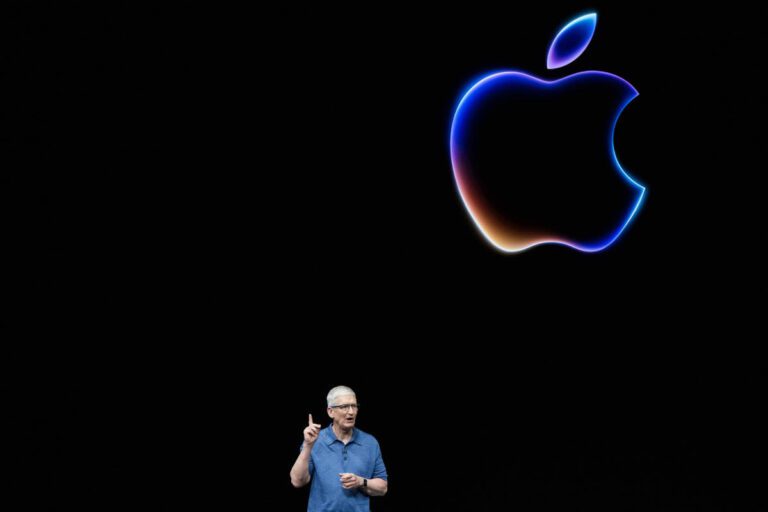Apple (AAPL) will host its annual iPhone launch event on Monday, September 9, at its headquarters in Cupertino, California.
CEO Tim Cook is expected to headline the keynote address, which will reportedly include the launch of the iPhone 16 lineup, the 10th anniversary edition of the Apple Watch and updated AirPods.
That’s a lot of hardware, but Wall Street isn’t counting on new iPhones or special edition Apple Watches to move the company’s stock price. Instead, all eyes will be on Apple’s Intelligence platform, which is powered by generative artificial intelligence.
Apple Intelligence is the company’s big initiative to bring generative AI capabilities to consumers’ iPhones, iPads, and Macs. Wall Street wasn’t too thrilled with how long it took Apple to announce its AI initiative, waiting impatiently for Microsoft (MSFT) and Google (GOOG, GOOGLE) have launched their own AI services for businesses and consumers.
But investors changed their minds when Apple introduced Apple Intelligence at its WWDC developer conference in June, sending the company’s stock price up about 15% and putting it ahead of Microsoft, Amazon, Tesla and Google in year-to-date performance.
Apple is making Apple Intelligence a key selling point for its latest phones, as its software will only run on last year’s iPhone 15 Pro or newer phones. And analysts are counting on that exclusivity to boost iPhone sales.
“Apple’s intelligence remains key to unlocking pent-up iPhone demand and accelerating the replacement cycle, and we expect Apple’s event to heavily highlight the integration of AI into the new iPhone 16,” Morgan Stanley analyst Erik Woodring wrote in a note to investors.
But Apple Intelligence could prove to be more than just a catalyst for iPhone sales. It could also shift the focus of generative AI in consumers’ eyes.
Apple’s AI Opportunity
You only need to look at Apple’s invitation to its September 9 trade show to understand that the company is betting on artificial intelligence. From the slogan “It’s Glowtime” to the multi-colored Apple logo meant to evoke Siri’s new look, the company is sending the message that this trade show will be a showcase for artificial intelligence.
Apple is integrating AI into its software products with features that summarize text message threads, surface priority emails in the Mail app, provide an improved Siri experience, and enable access to OpenAI’s ChatGPT.
Apple is also including basic AI tools, like writing tools that will help you improve your emails and documents by proofreading your text or reworking it to make it sound more professional or concise. The company also expects developers to jump on the AI bandwagon, creating new apps that take advantage of the technology through Apple devices.
“We estimate this could translate into $10 billion in annual growth in Apple’s high-margin services business as it comes together and marks the beginning of a new multi-pronged AI revenue stream, both hardware- and software-driven,” Wedbush analyst Dan Ives wrote in a note to investors.
“We believe the introduction of AI technology into Apple’s ecosystem will bring monetization opportunities both on the services side and on the iPhone and hardware side,” Ives added. And with that, a $30 to $40 per share increase, which will bring the company’s market cap to $4 trillion.
Apple isn’t the only company bringing generative AI to its smartphone lineup. Samsung has Galaxy AI software, which combines its own AI with some of Google’s smarts. Google also offers its own Gemini AI platform through its new Pixel 9 lineup of devices, including its Pixel 9 Pro Fold foldable phone.
Apple, however, has done a much better job than its competitors of explaining its AI offerings. At its June developer conference, it touted the software as a must-have for users, explaining how it integrates with the company’s various apps and services in ways that Samsung and Google haven’t been able to. by making AI more personal.
The risk of AI
But Apple is going to have to do more than that to get consumers excited about its AI efforts. I’m using Apple’s beta software on my iPhone 15 Pro Max, and while I appreciate its ability to summarize long text messages between friends (no one likes to sift through 40 messages to figure out what’s for dinner), and I find Mail’s prioritized email feature useful, it’s hard to say whether that will be enough to get consumers excited about the technology.
Apple will also have to take great care to ensure that its Apple Intelligence is accurate and not subject to the kinds of hallucinations that have led to criticism of AI software like Google’s AI Overview, which told people to add glue to their pizza and eat rocks.
Above all, Apple will need to ensure that Apple Intelligence is something consumers actually want to use and not a feature the company has had to force into its portfolio to appease investors who fear Apple will miss the boat on the next tech hype train.
Email Daniel Howley at dhowley@yahoofinance.com. Follow him on Twitter at @DanielHowley.
Read the latest financial and business news from Yahoo Finance.

